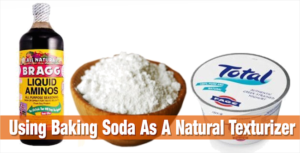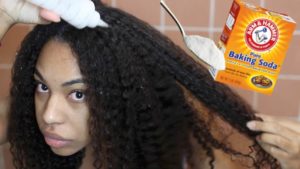Apple Cider Vinegar and Baking Soda Might be Damaging Your Hair
 I love talking to women who practice all natural regimens because it seems as if they can make a shampoo out of pure soil and water if you asked them to. While DIY is all the craze nowadays we have to be careful of what and how much of a particular ingredient we use when we are taking care of our hair the au naturale way.
I love talking to women who practice all natural regimens because it seems as if they can make a shampoo out of pure soil and water if you asked them to. While DIY is all the craze nowadays we have to be careful of what and how much of a particular ingredient we use when we are taking care of our hair the au naturale way.
Baking Soda and Apple Cider Vinegar are often used as cleansing agents to rid the hair of buildup and helps to seal the cuticles of the hair adding shine, so what if I told you that they can actually irritate the hair causing it to break and dry out over time?
For a DIY product to be considered healthy for our hair, the goal is to ensure that it has more of an acidic pH (like your hair’s natural pH) and avoid anything that is too alkaline. Apple Cider Vinegar* (ACV) and baking soda fall at opposite ends of the scale, with baking soda being the harsher of the two.
When Baking Soda does more harm than good
With a pH level of 9 baking soda is is very alkaline and is known to regulate pH when it is added to a acidic substance making the mixture is not too acidic nor too alkaline, essentially neutralizing it. This can be very beneficial especially if you have a shampoo that you are almost positive is too acidic for your hair. To create a balanced shampoo adding baking soda to the bottle can ensure that the strands are not stripped and dried out leading to porous hair.
Baking soda becomes almost as dangerous as a sulfate laden shampoo when it is used in water with no other chemicals. As a neutral agent, water has no effect on baking soda at a pH level of 9 so when you use baking soda on your hair by itself, you are stripping the hair of its naturals oils*, weakening the strands.
If you must use baking soda as a cleansing agent, add it to your sulfate shampoo, never use on it’s own.
When Apple Cider Vinegar* Does more Harm than Good
 We cannot deny the benefits of Apple Cider Vinegar (ACV) for our hair, it has anti-fungal properties and it makes the hair shiny and healthy looking reportedly after only one use. In comparison to baking soda, ACV has way more beneficial properties that have been reported and studied. ACV has an acidic pH which makes it perfect for sealing the cuticles of that hair and if you have hair color it will actually extend the life of the color if used correctly.
We cannot deny the benefits of Apple Cider Vinegar (ACV) for our hair, it has anti-fungal properties and it makes the hair shiny and healthy looking reportedly after only one use. In comparison to baking soda, ACV has way more beneficial properties that have been reported and studied. ACV has an acidic pH which makes it perfect for sealing the cuticles of that hair and if you have hair color it will actually extend the life of the color if used correctly.
With that said, over doing it with ACV can cause more damage than you may have bargained for. Make sure that before you apply ACV to your hair it is diluted properly, a great recipe is 1 parts ACV to 4 parts water (although you can dilute it even further to 8 parts water). If the solution is too concentrated, you may end up with hair that is brittle and unbelievably dry over time.
If you use ACV as a final rinse and you notice that your hair is drier than normal, check to make sure that your mixture is not too concentrated with the vinegar, and adjust it to suit your needs.
Have you found any negative side effects with using Baking Soda and ACV on your hair?




